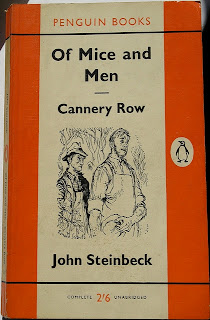I tried this out with a year 10 class last week, in a lesson on ‘Of Mice and Men.’ I had never taught this class before and found out moments before beginning the lesson that they had never read the book. Trying to get the students to answer the question ‘How does the language in the extract influence your view of Crooks?’ suddenly seemed not only foolish but impossible.
However, the postcard method really worked! I provided students with three different colours of pen to help them annotate the extract, by focussing on three different types of description. Breaking up the text on the postcards, forced the students to really examine the words used by Steinbeck. The different coloured pens allowed them to quickly visualise how Steinbeck’s word choices worked together (or apart). The feedback session was really fruitful as we were able to explore how Steinbeck’s use of words varied and developed across the text and how this related to the historical context.
The best ideas are often the simplest and this is a really simple one. Breaking up a text into smaller chunks is certainly not a new suggestion and using coloured pens to annotate is something I am sure we have all done before. Putting these two together, however, allowed these students to untangle language choices rather than getting tied up in knots with literary terms.
Try it for yourself! Download the resources below:
– Of Mice and Men Language Lesson Plan
– Of Mice and Men Language Lesson PowerPoint
Naomi Hursthouse



